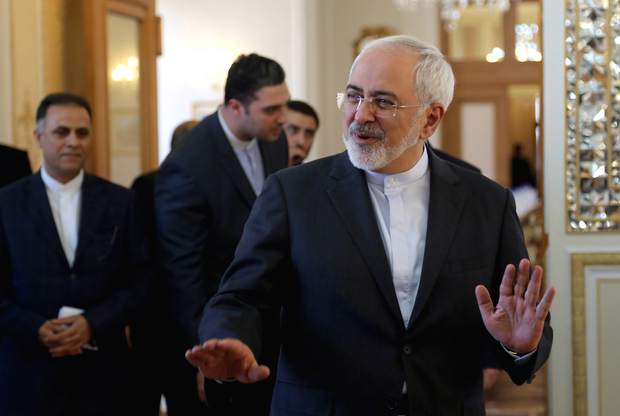OFAC General License H: The H is for Hold Your Horses

Iranian Foreign Minister Mohammad Javad Zarif gestures as he arrives for a meeting with his Japanese counterpart, Fumio Kishida, on October 12, 2015 in the capital Tehran. Kishida said on his visit to Tehran he hoped Iran’s nuclear deal with world powers would be swiftly implemented because his country wants to benefit from it. AFP PHOTO / ATTA KENARE
Unless you’ve been living under a rock since last Friday, you have probably heard that Implementation Day–the day in which the sanctions relief promised under the Joint Comprehensive Plan of Action reached between Iran and P5+1 last summer begins to come into effect-occurred over the weekend. As such, the United States Department of the Treasury’s Office of Foreign Assets Control (“OFAC”) has issued guidance, statements of licensing policy, and a few new general licenses to implement the sanctions relief that was promised. Chief amongst these new general licenses is the much anticipated OFAC General License H which authorizes U.S. owned or controlled foreign entities to engage in transactions with Iran that are otherwise prohibited by 31 C.F.R. § 560.215.
The issuance of this new general license has prompted a flood of inquiries to our office about what this new authority means for U.S. persons seeking to transact with Iran. The inquiries range all the way from serving as a sales agent for a foreign subsidiary of a U.S. company in its Iran-related business to setting up new entities in third countries through which U.S. persons can invest in Iran-related projects. In short, many people are not seeing General License H for what it is–an authorization to ensure that foreign entities are not put at a disadvantage in relation to their competitors due to U.S. ownership–and are assuming that General License H was intended to create a loophole for U.S. persons to engage in commercial activity in Iran through foreign intermediaries without having to drastically alter the U.S. primary trade embargo (the Iranian Transactions and Sanctions Regulations[“ITSR”]) which remains largely intact post-Implementation Day.
When it comes to OFAC, it is always dangerous to assume anything. As such, here are three things to consider about General License H before you set up that foreign subsidiary to start investing in Iran’s energy sector:
1.There are Still Facilitation Concerns: Those with familiar with the ITSR may recall that 31 C.F.R. § 560.208 prohibits facilitation of transactions between foreign parties that would be prohibited were the U.S. person directly involved. In other words, you cannot help others do that which you cannot directly do. OFAC General License H does address this prohibition in regards to transactions between U.S. owned or controlled foreign entities and Iran; however, its authorization is limited. In short, General License H only authorizes those transactions which would otherwise be prohibited facilitation that are 1) related to establishing or altering policies and procedures to allow U.S.-owned or controlled foreign entities to transact with Iran, and 2) those transactions involving the provision of automated and globally integrated systems for communication and data processing. Any transactions by a U.S. person outside of those two categories that allow a foreign entities’ transactions with Iran could be considered prohibited facilitation or an export of services to Iran.
2. General License H does not Allow U.S. Persons to Broker Deals between Foreign Subsidiaries and Iran: Dovetailing off of the point above, and as explicitly noted in General License H, U.S. persons are only authorized to engage in those transactions that involve establishment or alterations of corporate policies or provision of automated and globally integrated systems for communication and data processing. While this does allow for a U.S. person executive or senior manager of a foreign entity to make an initial decision to engage in Iran-related business, once that decision is made, no other services–except those described above–can be provided by the U.S. person in relation to that transaction unless some other exemption or authorization applies. Thus, a U.S. citizen senior manager at a foreign entity can be involved in the decision to engage Iran-related business, but cannot be involved in setting up and negotiating those deals.
3. Formation of Foreign Entities for Iran Related Business: Whether U.S. persons can form foreign entities solely for the purposes of carrying out Iran-related business under General License H is certainly a question that has, and will continue to, come up a lot, as U.S. persons seek to find a legal way to do business with Iran. The OFAC guidance issued on Implementation Day is not entirely clear as to this point, but the idea that a U.S. person company would be able to form an entirely new entity outside of the U.S. and have it operated with independent of U.S. persons, seems dubious, at least in the short term. U.S. persons seeking to engage in such a strategy should exercise extreme caution, as the potential for violations of the ITSR is high. In addition, those parties should keep in mind that it is the U.S. owners of the foreign entity who will be held liable for the violations of the foreign entity.
In reality, the sanctions relief afforded by the JCPOA is similar to a reset to 2010 before all of the major secondary sanctions were put into place. Thus, if you couldn’t engage in an Iran-related transaction prior to 2010, then you probably cannot do so now. This is, of course, an oversimplification, but the larger point is that U.S. persons are still bound by prohibitions that cover virtually all transactions with Iran; thus, OFAC compliance is still mandatory and crucial.
The author of this blog is Erich Ferrari, an attorney specializing in OFAC matters. If you have any questions please contact him at 202-280-6370 or ferrari@ferrariassociatespc.com


